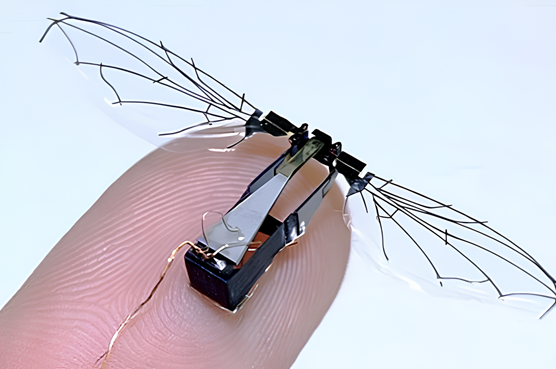Crop pollination with mini-robots: Ghanaian start-up eyes collaboration with US Universities
Mariama Sherifa Brahimah
Tamale, Ghana March 27, 2025
A Ghanaian start-up is considering a business and scientific collaboration with US universities to test, develop and deploy mini-robot that pollinate plants. Climate change and other recurrent natural disasters are affecting agriculture across Ghana. They include uneven rainfall, drought, and pest invasion. Irrigation has been the preferred solution to these natural changes. But this approach requires complex, expensive infrastructure, and costly maintenance. In 2017, the government of Ghana launched the ‟One Village One Dam Policy” to reduce reliance on rainfall and allow year-round farming across the country. In 2021, the Ghana Investment Promotion Center (GPIC) reported that 507 small earth dams out of the 560 targeted.
The agricultural land area covers represent 57 percent of the country’s total land area. The ministry estimates that 50 percent of this arable land is under cultivation and only 222,978 hectares are under irrigation. Other studies have reported that these irrigation schemes did not yield their expected outcome, thus forcing Ghana to look for alternative and sustainable solutions.
Tackling agricultural decline
Ghana wants to reverse the decline of its agricultural sector. In 2017 when the Cocoa Board (COCOBOD) launched the ‟Hand Pollination”. The Cocoa institution called the scheme ‟a nationwide implementation of the novelty to increase yields and provide sustainable incomes for farmers”. The goal, it said, was to increase productivity to over 1000 kg per hectare. With this approach, the COCOBOD wanted cocoa farmers to gain skills in hand pollination. The COCOBOD exited the program after training pollinators who continue to help farmers to undertake the activity for a fee.
Artificial Hand Pollination was a component of a large program to boost cocoa productivity. The COCOBOD called it the Productivity Enhancement Programs (PEPs). Its goal was to reverse declining cocoa yields. Hand pollination was part of the so-called ‟4Ps”: Pruning, Pollination, Poultry Manure, and Protection. But, hand pollination has produced mixed results. After recording its highest ever cocoa production of 1,047, 000 metric tons during the harvest season 2020/2021, production has declined and continues to stagnate 800,000 tons per year. Other factors, such as crop diseases, smuggling and the devastating activities of illegal gold miners have also contributed to the fall.
Technology to the rescue
Technology is about to bring an innovative and sustainable solution to at least the pollination issue. Researchers at US universities have developed small drones for pollination and other agricultural applications.
The Boston-based Massachussets Institute of Technology (MIT) reports that Assistant Professor Kevin Yufeng Chen has built a system that mimics the agility of insects. The tiny bot can fly, dodge, and avoid obstacles, line actual insects like bees or butterflies. Professor Chen is a member of the Department of Electrical Engineering and Computer Science and the Research Laboratory of Electronics. He says that his insect-sized drones have unprecedented dexterity and resilience. Professor Chen envisions robots eventually assisting humans with crop pollination or inspecting machinery in tight spaces1.
RobotBee: A mini-drone for plant pollination and more

Photo ©: The bLife Movement
In a similar development, the Wyss Institute at Harvard University has developed ‟autonomous micro-aerial vehicles capable of self-contained, self-directed flight and of achieving coordinated behavior in large groups”. Inspired by the biology of a bee, researchers at the Wyss Institute are developing RoboBees; a man-made system that performs myriad roles in agriculture or disaster relief.
The Wyss Institute says that Applications of RoboBees incorporates a distributed environmental monitoring, search-and-rescue operations, and with crop pollination. The Institute is looking for collaboration to turn the idea into a commercial product and venture. It seeks ‟to create unique collaborations with academic institutions, industry, investors, foundations, and philanthropists”, who share the ‟vision of bridging the divide between breakthrough scientific discovery and commercial impact”2.
Ghana and drones
Ghana does not manufacture nor assemble drones but a Ghanaian start-up told New Economy Ghana that it is preparing a collaboration bid to work with US universities to bring this new technology to West Africa.
Since November 2020, the government has granted authorization to at least five companies to import and provide drone services in the country. They are SKT Aeroshutter, Rocketmine Aerial Data Solutions, Zipline International, Rudan Engineering, and Axis Drone Surveys. Ghana has experience in using drones for delivery of services. Zipline, a US company, in partnership with the Ghana Health Service, started operations on 24th April 2019 to deliver medical supplies with drones. The company operated from two drone bases at Mampong, Omenako, Kukua, and Sefwi Wiaws. Doctors place an order for the product they need. Zipline operators package the product into the drone, which then launches into the air, flying 100km/hour.
Zipline drones are autonomous and battery-powered. They fly over the ordering-hospital or clinic and drops the package mid-air. The package floats down, using a parachute to slow its momentum, and the drone flies back to the Zipline distribution center to be reloaded.
The Ghana Police Service uses drones to detect and combat crime. It has adopted drone technology to complement the work of officers on the ground. Axis Drone Surveys provides drone surveying solutions for electrical, agricultural mapping, mining, railway, and other engineering. Finally, in September 2023, Latvia company Fixar delivered Fixar 007 drones to the Ghanaian army. These unmanned aerial vehicles (UAV) serve in a variety of mission including border security, reconnaissance, search, and rescue.
In the future, Ghana will capitalize on this experience with drones. If the country adopts RoboBees when it becomes commercial operational, this nano technology application could help Ghana tackle the chronic problems that impede its agricultural developments.
Related Articles
BIBLIOGRAPHY
1❩ https://news.mit.edu/2021/researchers-introduce-new-generation-tiny-agile-drones-0302
2❩ https://wyss.harvard.edu/technology/robobees-autonomous-flying-microrobots/
